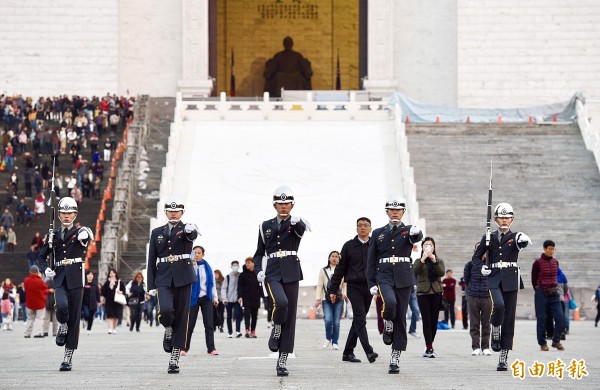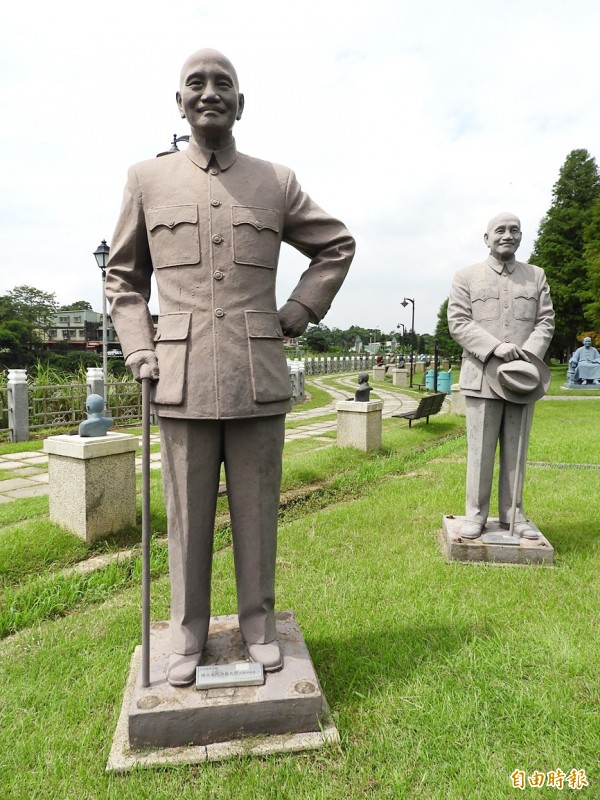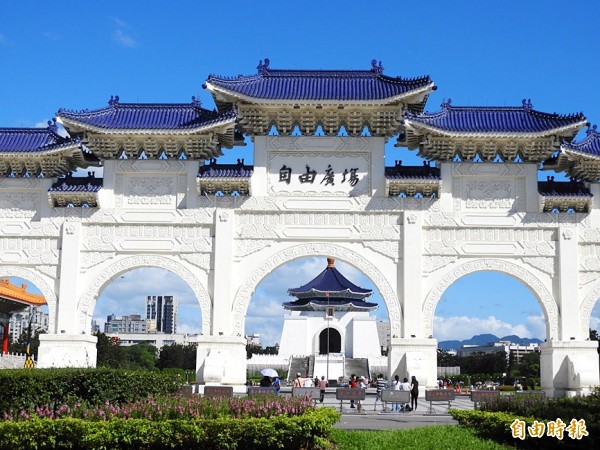《TAIPEI TIMES》 Commission urges end to Chiang memorial guards

Honor guards march in front of the Chiang Kai-shek Memorial Hall in Taipei’s Zhongzheng District yesterday. Photo: Peter Lo, Taipei Times
REPURPOSING PLAN: Acting commission head Yang Tsui said that the site could be used to commemorate historical events and to teach about human rights
By Chen Yu-fu and Jonathan Chin / Staff reporter, with staff writer
The Transitional Justice Commission yesterday recommended that the government abolish military honor guards at the Chiang Kai-shek Memorial Hall in Taipei.
The measure is part of the commission’s five-item list of recommendations to the Ministry of Culture to remove authoritarian symbols from the public monument, Acting Commission Chairwoman Yang Tsui (楊翠) told a news conference in Taipei.
The ministry has not yet made a specific determination regarding the site and the commission’s intent is to provide suggestions that would help to guide policy in a way that meets the public’s expectations for reform, Yang said.
The five recommendations are: to expunge authoritarian characteristics; create a historical record of authoritarianism and dissidence; promote public research and education; establish an organization for implementation; and carry out interim transitional justice tasks during the legislative process, she said.
The authoritarian symbols of the memorial should be changed so that the public’s right to use and interpret the space is established, she said, adding that the site’s layout imposes a party-state historical narrative and cult of personality.
As the site had once housed barracks for Japanese colonial-era troops, then became Republic of China Army headquarters before being the setting for protests after the Martial Law era, the hall could be repurposed to commemorate important historical events of the area, Yang said.
Following the establishment of a new management office, the site should be dedicated to public education on human rights, comparative study of authoritarianism and the preservation of historical documents, Yang said.
An independent entity or a non-governmental organization should be established to provide oversight of the management office, she said.
The committee advises that permanent exhibits on democracy and human rights should be housed at the site as a substitute for military honor guards, which should be discontinued, she said.
Although the Legislative Yuan has not passed a law to establish a Chiang Kai-shek Memorial Hall management office, the committee deems the removal of ceremonial guards necessary in light of the site’s high profile as a recreational space and tourist attraction, she said.
Yang said the commission was still deliberating with the Ministry of Culture and the Ministry of National Defense a timetable to phase out the honor guards.
Minister of National Defense Yen De-fa (嚴德發) last month told legislators on the Foreign Affairs and National Defense Committee that statues of Chiang Kai-shek (蔣介石) and institutions that bear his name should not be changed, as the “late president the honorable Chiang was the first principal of the army academy and made significant contributions toward the creation of a national military.”
Government offices have reported that they have 1,038 statues and 105 images of Chiang and his son former president Chiang Ching-kuo (蔣經國) in their possession that were or are displayed in public buildings and properties, the commission said yesterday.
That number did not include those in Hualien County and Keelung, which have yet to complete counts, it said.
Citing Article 5 of the Act on Promoting Transitional Justice (促進轉型正義條例), commission member Greg Yo (尤伯祥) said that the law explicitly requires the government to remove all symbols of authoritarianism from the public sphere.
“As an establishment of the executive branch, the Ministry of National Defense has an obligation to follow the law,” Yo said. “Removing authoritarian symbols is the final step for the armed forces to be truly an institution of the nation.”
The defense ministry in a press release said that the armed forces are the defender of the Republic of China’s existence.
The military will keep their statues and images “out of respect for history, acknowledgment of our origins and the continuation of our glorious tradition,” it said.
新聞來源:TAIPEI TIMES

Statues of Chiang Kai-shek stand in the Cihu area of Taoyuan’s Dasi District yesterday. Photo: Chen Yu-fu, Taipei Times

People walk under the main gate of Liberty Square outside the Chiang Kai-shek Memorial Hall in Taipei’s Zhongzheng District yesterday. Photo: Chen Yu-fu, Taipei Times












